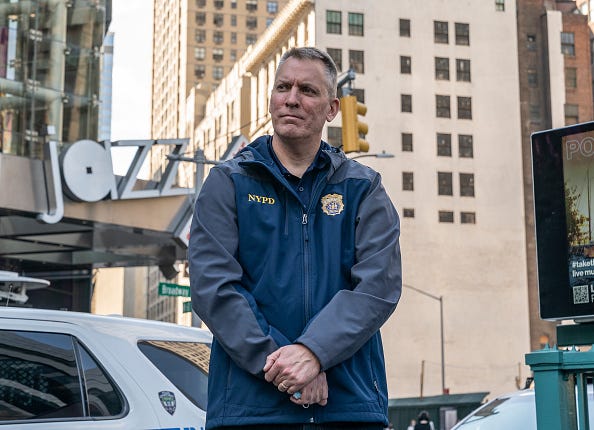
NEW YORK (1010 WINS) -- In his final days as commissioner of the NYPD, Dermot Shea told WINS’ Juliet Papa about his decades with the department and years leading it, with gun-related crime being a major focus as he departs.
Shea told WINS “absolutely nothing is happening to people when they get caught with a gun," he said in the comprehensive 25-minute interview.
Shea, who spent just over two years as commissioner, but 30 years overall with the NYPD, said the “revolving door of justice” is the problem, and it’s something he doesn’t think New Yorkers will continue to stand for.
“So [criminals] go right back on the street and guess where they are tomorrow — they're on the same corner with another firearm,” said Shea.
Shea said the department has made more gun arrests in the last two years than in the department had seen in decades. Troubling stats back it up — he has repeatedly pointed to 10% of every arrest made of people under 18 years old involves a gun.
He said some are in gangs, while others are living in fear, meaning people who wouldn’t ordinarily carry end up getting a gun, according to Shea.
Shea said precision policing has been addressing the issue, but added that there are 5,000 open gun cases stuck in the courts.
“When are they going to be held accountable?” Shea wondered. “We're paying a price for all those policy and decisions on the front lines. We went from the place just two years ago where we had days without shootings, to, you know, I'll spend 30 minutes in the morning every morning, first thing I do, looking at last night's pages on how many shootings happened across New York City.”
The commissioner said fixes can be made that will lead to less incarceration, but he thinks it needs to start by “taking the worst of the worst” off the streets, and then turning to making positive changes to help kids.
Shea joined other police chiefs upstate in calling for a change in bail reform laws. He said his successor will need to navigate the politics and pressure of the role, but was excited for them.
“I’m incredibly optimistic, envious in some ways of who's coming in because they're in for the ride of their life,” said Shea. “I feel that I've received more from this job, including the last two years, than I could ever give back.”
Rising crime rates in some categories have been a cause for concern. November’s citywide stats showed a drop in murders compared to the same time in 2020, but there was a 40% increase in grand larceny, a 24% jump in robbery and an 11% increase in serious assaults. Transit crimes were also up 106% from last November.
Shea said that before the pandemic hit, months after when he assumed the role as commissioner, the department was touting impressive crime numbers.
“We had achieved I think something incredible in terms of the lowest crime, we were putting some people in your field out of business,” Shea told WINS. “There was no crime to talk about in New York City, there was days of no shootings and we had the lowest incarceration. We had every police department in this country coming here saying, ‘How are you doing it?’”
Comparing the city’s November 2021 crime numbers to the same time in 2019, robberies are up by 260, burglaries went up by 370 and grand larcenies were up by over 750.
Transit crimes were at similar levels from 2021 to 2019, while shooting incidents more than doubled.
Hate crimes have been another topic of focus — with police denoting a doubling in reported hate crimes in 2021 from 2020, with anti-Asian and anti-Semitic crimes skyrocketing.
“Mental illness is a huge problem in New York City right now, there's no denying it,” said Shea, who spoke again on bail reform laws and the effects of the pandemic.
So what is the fix for bail reform laws? Shea said, “You have to give the judges the ability to keep people in jail. If you don't trust judges, we have far bigger problems. You have to stagger the discovery process ... we're doing all this work intentionally crafted by people that wanted to blow up the system and they, and they got what they wanted.”
Shea talked at length about what he’d like to see to make positive changes in the criminal justice system.
“Divert them out of the criminal justice system wherever possible — but when they’re diverted out of the criminal justice system, I ask you, where are they going?” Shea said. "And right now they’re going right back on the street. We create fancy terms like supervised release that are nonexistent … you need real mentorship, positive influences, controlled environments.”
“Let’s create an area, a camp, where you can give them training, where you can give them schools, when they do well with real professionals, teaching and being mentors. I mean, you’ve got to do this,” he continued.
Shea will exit the department alongside Chief of Department Rodney Harrison and Deputy Commissioner Benjamin Tucker at the end of the year, just as City Hall changes hands from Bill de Blasio to Eric Adams, a former cop himself.
Adams hasn't officially made his commissioner selection, but reports suggest he could pick the NYPD's first woman commissioner in the coming days, with the former chief of the Seattle Police Department and current commissioner of the Philadelphia Police Department reportedly as his top two.
Shea said he's only going to be taking a few weeks off before getting back to work somewhere.
"My wife would kill me if I retired and stayed home ... I'm under strict orders to get a job," said Shea. He wouldn't say what's next, but he looks to have an idea.
"I have some pretty good possibilities."






